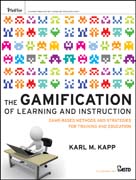
The gamification of learning and instruction: game-based methods and strategies for training and education
Kapp, Karl M.
Learning professionals are finding success applying game-based sensibilities to the development of instruction. This is the first book to show how to design online instruction that leverages the best elements of online games to increase learning, retention, and application. It explains how to match different game strategies to types of learning content for the right learning outcome anddiscusses how gamification techniques can be used in a variety of settings toimprove learning, retention and application of knowledge. Supported by peer-reviewed studies and examples from corporations who have adopted game-based learning successfully, the book illustrates how combining instructional design thinking with game concepts can create engaged and interactive learning experiences across a variety of media, from online to face-to-face. INDICE: List of Figures and TablesForeword by Kevin KrusePrefaceAcknowledgmentsAbout the AuthorContributorsChapter One: What Is Gamification?Chapter QuestionsIntroductionGamification in ActionWhat Is a Game?What Is Gamification?What Gamification Is NotGamification Versus Serious GamesGrowth of GamificationWho Is Using GamificationImplications and Importance to the Future of LearningKey TakeawaysChapter Two: It's in the Game: Understanding Game ElementsChapter QuestionsIntroductionAbstractions of Concepts and RealityGoalsRulesConflict, Competition, or CooperationTimeReward StructuresFeedbackLevelsStorytellingCurveof InterestAestheticsReplay or Do OverImplications and Importance to the Future of LearningKey TakeawaysChapter Three: Theories Behind Gamification of Learning and InstructionChapter QuestionsIntroductionMotivationDistributed PracticeScaffoldingEpisodic MemoryCognitive ApprenticeshipSocial Learning TheoryFlowKey TakeawaysChapter Four: Research Says . . . Games Are Effective for LearningChapter QuestionsIntroductionGame ResearchRandel's Meta-AnalysisWolfe's Meta-AnalysisHay's Meta-AnalysisVogel's Meta-AnalysisKe's Qualitative Meta-AnalysisStizman's Meta-AnalysisElements of GamesKey TakeawaysChapter Five: Leveling Up:What Gamification Can DoChapter QuestionsIntroductionImproving Surgeon Hand-Eye CoordinationSolving ProblemsTeaching Higher Order SkillsThinking the UnthinkableThinking Like Your OpponentEngaging Learners in a Live ClassroomHelping People Lose WeightMaking Physical Therapy More EnjoyableInfluencing Pro-Social BehaviorTesting Knowledge and PerformanceGood for Young and OldKey TakeawaysChapter Six: Achiever or Killer? Player Types and Game PatternsChapter QuestionsIntroductionTypes of PlayPlayer Skill LevelsBartle's Player TypesCaillois' Pattern of PlayGame InteractionsKey TakeawaysChapter Seven: Applying Gamificationto Problem SolvingChapter QuestionsIntroductionDifferences Between Novices and ExpertsTurning Novices into ExpertsPreparing Fire FightersGamification of Problem SolvingKey TakeawaysChapter Eight: Applying Gamification to Learning DomainsChapter QuestionsIntroductionDeclarative KnowledgeConceptual KnowledgeRules-Based KnowledgeProcedural KnowledgeSoft SkillsAffective DomainPsychomotor DomainKey TakeawaysChapter Nine: Managing the Gamification Design ProcessChapterQuestionsIntroductionDevelopment Process: ADDIE vs. ScrumTeamDesign DocumentPaper PrototypingKey TakeawaysChapter Ten: Congratulations! Selecting the RightIn-Game Achievements (Lucas Blair)Chapter QuestionsIntroductionMeasurement vs. Completion AchievementsBoring vs. Interesting TasksAchievement DifficultyGoal OrientationExpected vs. Unexpected AchievementsWhen Achievement NotificationOccursAchievement PermanenceWho Can See Earned Achievements?Negative AchievementsAchievements as CurrencyIncremental and Meta AchievementsCompetitive AchievementsNon-Competitive Cooperative AchievementsKey TakeawaysChapter Eleven: Perspective of a Gamer (Nathan Kapp)Chapter QuestionsIntroductionGamer GenerationMario Kart: Thinking Outside the BoxMadden Football: Analyzing ProblemsRuneScape: The Art of the DealCivilization Revolution: Balancing ResourcesGames vs. SchoolKey TakeawaysChapter Twelve: Casual Game Site: DAU Case Study (Alicia Sanchez)Chapter QuestionsIntroductionGames and Simulations in the CurriculumDAU Casual Games InitiativeGames PortalKey TakeawaysChapter Thirteen: Alternate Reality Games for Corporate Learning (Koreen Olbrish)Chapter QuestionsIntroductionZombie ApocalypseWhat Is an ARG?ARG TerminologyDesign Principles for ARGsPotential of ARGsKey TakeawaysChapter Fourteen: The Future of the Gamification ofLearning and InstructionChapter QuestionsIntroductionPick a Card, Any Card—A Game of PhonesSurvival MasterThe Virtue of GamificationNext StepsKey TakeawaysGlossaryNotesIndex
- ISBN: 9781118096345
- Editorial: Pfeiffer
- Encuadernacion: Rústica
- Páginas: 336
- Fecha Publicación: 02/05/2012
- Nº Volúmenes: 1
- Idioma: Inglés
